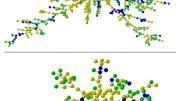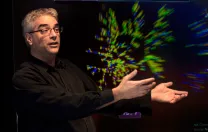As research is illuminating the human social networks that have existed since time immemorial, a parallel thread of inquiry is exploring a new kind of social interaction: online friendship. At Harvard, Nicholas Christakis’s lab (see main article), has been gathering and studying data on the Facebook pages and usage habits of one recent class at “a diverse private college in the northeast United States.”
But because Facebook “friends” are often what we call “acquaintances” in the offline world, researchers had to find a way to weed through a Facebook user’s “friendships” to find the most meaningful relationships. They developed a concept they call the “picture friend”—someone with whom a subject has appeared in a photograph posted on Facebook. The definition of a picture friend also requires the subject to have “tagged” the photograph with the friend’s identity. This helps weed out group photographs in which not everybody knows each other, and indicates that the subject wishes the association with the tagged friend to be recognized.
The numbers alone were interesting. Although the average number of Facebook friends wasn’t far from Dunbar’s number (a number that some argue represents the maximum number of people the human brain can keep straight, and the maximum size for a smoothly functioning social group; see “Networks, Neolithic to Now”), the number of picture friends was 6.6—close to the size of the core discussion network. That concept, coined and studied by Geisinger professor of sociology Peter Marsden, who has taught about social networks at Harvard since the 1980s, denotes the people with whom we spend free time and discuss important matters—the people with whom our friendship is tangible and quantifiable, with whom we interact on a regular basis.
As a proxy for happiness, Christakis and colleagues also examined whether or not the students in the Facebook sample were smiling in their profile photos. The resulting network map (see image) looked uncannily like the map showing happiness or unhappiness in the Framingham Heart Study (to read about their findings from this dataset, see “Costs and Benefits of Connection”). Both the non-smilers on Facebook and the unhappy Framingham subjects were distinct minorities—and they tended to cluster together, even falling in similar locations in the network when the two maps were compared.
There are some differences: for example, researchers found that influence on tastes in books and movies doesn’t spread through Facebook friends, but does spread through friendships that began offline but are maintained online. But in many other ways, the online and offline worlds are remarkably similar. In fact, in their book, Connected, Christakis, a professor of medical sociology, and James Fowler ’92, Ph.D. ’03, now a political scientist at the University of California, recount the case of a woman who divorced her real-life husband after finding his avatar “cheating”—having virtual sex with another player’s avatar—in the video game Second Life.
The authors argue that websites—social, dating, video-game, or otherwise—“just realize our ancient propensity to connect to other humans, albeit with electrons flowing through cyberspace rather than conversation drifting through the air. While the social networks formed online may be abstract, large, complex, and supermodern, they also reflect universal and fundamental human tendencies that emerged in our prehistoric past when we told stories to one another around campfires in the African savanna.”










